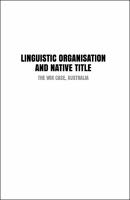Linguistic Organisation and Native Title
The Wik Case, Australia
Abstract
Classical Aboriginal societies in Australia have commonly been described in terms of social organisation and local organisation. This book presents rich detail on a third and related domain that has not been given the same kind of attention: linguistic organisation. Basing their analyses on fieldwork among the Wik peoples of Cape York Peninsula, north Australia, Peter Sutton and Ken Hale show how cosmology, linguistic variation, language prehistory, clan totemic identities, geopolitics, land use and land ownership created a vibrant linguistic organisation in a classical Aboriginal society. This has been a society long in love with language and languages. Its people have richly imbued the domain of rights and interests in country—the foundations of their native title as recognised in Australian law—with rights and interests in the abundance of languages and dialects given to them at the start of the world.
Keywords
Wik people; Aboriginal languages; Cape York; MultilingualismDOI
10.22459/LONT.2021ISBN
9781760464479, 9781760464479Publisher
ANU PressPublisher website
https://press.anu.edu.au/Publication date and place
Canberra, 2021Imprint
ANU PressSeries
Asia-Pacific Linguistics,Classification
Dictionaries
Language: history and general works
Linguistics
Historical and comparative linguistics
Australasian and Pacific history
Indigenous peoples
Relating to Indigenous peoples


 Download
Download